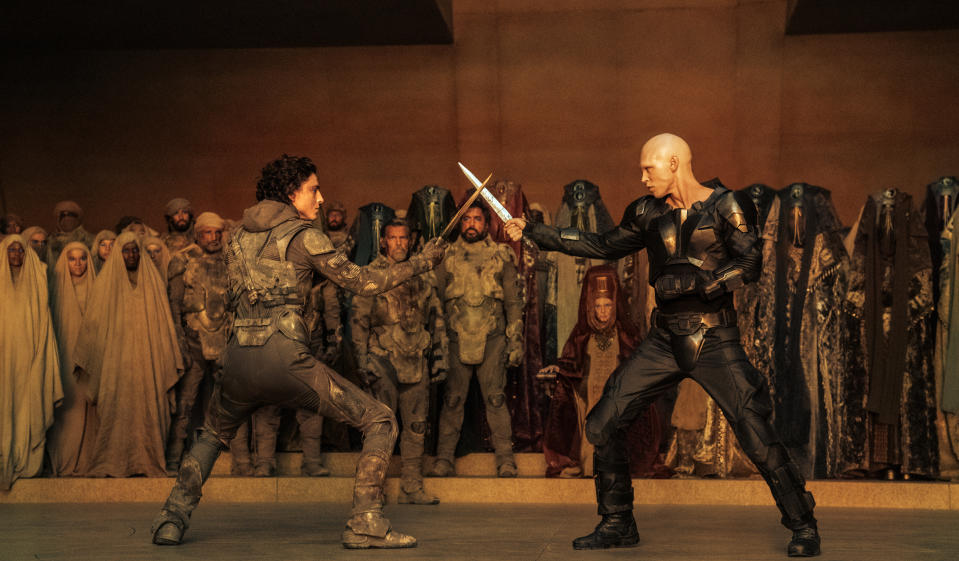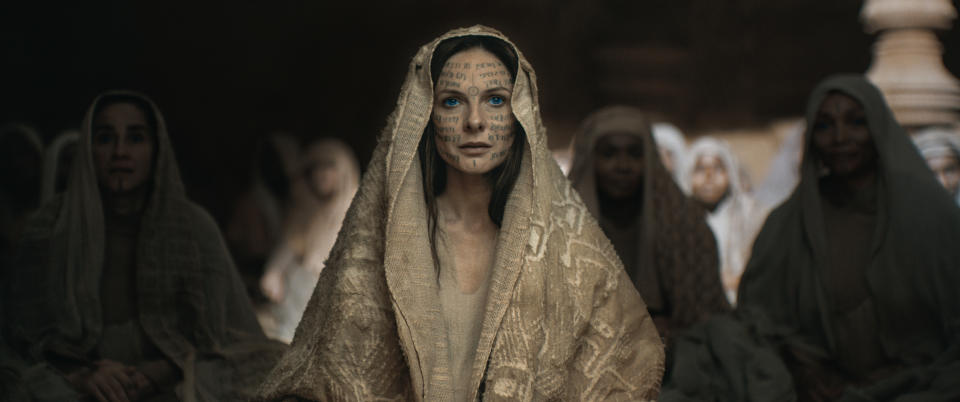The Origin of the Atreides-Harkonnen Feud at the Heart of 'Dune: Prophecy'

Emily Watson in <i>Dune: Prophecy</i> Credit - Attila Szvacsek—HBO
Warning: This post contains spoilers for the first episode of Dune: Prophecy.
The HBO series Dune: Prophecy is set about 10,000 years before the birth of Paul Atreides, the protagonist of the original Dune books. Sadly, that means Timothée Chalamet—who plays Paul in Denis Villeneuve's ongoing adaptation of Frank Herbert's Dune novels—won't be making any cameos as a hot prophet in the six-episode season. But the good news is his ancestors play a big role in the show, as do the ancestors of Paul's rival, Feyd-Rautha Harkonnen (played by an eyebrow-less Austin Butler in Dune: Part 2) and those of his betrothed, Princess Irulan (Florence Pugh, who looked regal for the 7 minutes and 47 seconds she was onscreen in the Dune sequel).
Dune: Prophecy is loosely based on the novel Sisterhood of Dune, co-written by Frank Herbert's son, Brian Herbert, and Kevin J. Anderson. The show centers on Valya Harkonnen (Jessica Barden and later Emily Watson), who joins a cult of witches and eventually earns the title Mother Superior of the Sisterhood. The Sisterhood will eventually become the Bene Gesserit, the mystical clan to which Paul's mother Jessica (Rebecca Ferguson) belongs.
Read More: Breaking Down the Complex Family Tree in the Dune Universe
Valya is not a good person. We see early in the show that she uses the Voice—a deep, foreboding register that she can summon in order to force people to do her bidding—to make a fellow Sister slit her own throat. But what did you expect? Her descendants are creepy, hairless dudes who torture people for fun.
Still, Dune: Prophecy does try to conjure up some sympathy for the Harkonnens, who, according to their own family mythology, were unjustly condemned by an Atreides and then banished to a barren ice world. They're doomed to sell smelly whale meat for a living.
If the Atreides-Harkonnen feud sounds familiar, that's because it's a key plot point in the two Dune movies. Giant slug-man Baron Vladimir Harkonnen (an unrecognizable Stellan Skarsgård) tortured the noble Duke Leto Atreides (Oscar Isaac, naked for some reason) in Dune: Part 1. And Paul Atreides and Feyd-Rautha Harkonnen engage in a West Side Story-esque rumble in Dune: Part 2.

Now, you may be wondering, how is it that this family feud has persisted across 10 millennia?Apparently little has changed in the Imperium between the events of Dune: Prophecy and Dune. Mark Strong plays Emperor Javicco Corrino in Dune: Prophecy, and it's his line that will eventually produce Christopher Walken's Emperor Shaddam Corrino IV and Pugh's Princess Irulan Corrino. Arrakis remains a terrifying yet coveted planet because it is home to the precious resource of Spice. Even the shield technology that soldiers deploy when fighting is identical. Sure, the characters in Dune are scared of "thinking machines" or A.I. But, for perspective, the fall of Rome was just 1,548 years ago. And 10,000 years ago was the end of the Ice Age. (For technology, the ruling family, or even the outfits to have not changed in 10 millennia in the Dune universe is a bit mind-boggling. But I digress!)
Read More: A Dune Family Tree to Help Explain That Part Two Surprise Reveal
The fact that the Atreides-Harkonnen feud has persisted from the time of Dune: Prophecy to Dune suggests that the rivalry is essential to Herbert's universe. Yet the origins of the rift go largely unexplained in Herbert's original series. Characters reference that it began during a great war but don't dive into the details. Here's the background of the Harkonnen-Atreides rivalry.
The original Dune book offers only hints about the origin of the feud

Lady Jessica briefly alludes to the origins of this blood feud in the pages of Frank Herbert's Dune upon which Villeneuve's movies are based. As a political power struggle builds between the Atreides and the Harkonnen families, Jessica observes, "The Harkonnens won’t rest until they’re dead or my Duke destroyed... The poison in [Baron Harkonnen], deep in his mind, is the knowledge that an Atreides had a Harkonnen banished for cowardice after, the Battle of Corrin.”
That's pretty much all that Frank Herbert says on the matter. We never find out the details of the cowardly act. Frank Herbert's son, Brian Herbert, carried on his legacy and wrote books set in the Dune universe, including one titled The Battle of Corrin. Many Dune fans do not consider Brian Herbert's books canon. But some of his stories are the loose basis for Dune: Prophecy, so they're probably worth summing up here, whatever their literary merit.
What went down at the Battle of Corrin

According to Brian Herbert, many millennia before the events of Dune, humans were enslaved by A.I. (Think: Terminator or The Matrix or Battlestar Gallactica...or really any sci-fi property written in the last century.)
A group of human rebels rose up against what are called the "thinking machines." A guy named Vorian Atreides lead humanity's army in the last battle on the planet of Corrin. There, the machines held two million humans captives in cargo containers that were rigged to explode as soon as the human military advanced.
Read More: How the Ending of Dune: Part Two Sets Up a Third Movie
Hundreds of billions (yes, I said billions) of humans had already died in the war. Vorian argued they ought to sacrifice the two million hostages to end the conflict. But Bashar Abulurd Harkonnen, who served under Vorian, disagreed. The two argued and Vorian dismissed Abulurd. Abulurd, in an attempt to save the captives, disarmed the weapons of the entire human fleet, crippling them in their fight against he machines.
Abulurd's betrayal resulted in an extremely bloody battle. At the end of the war, Vorian branded Abulurd a coward, and the Imperium banished him to a desolate planet where his family could eke out a living selling whale meat. Which, again, is a bit grim.
Where the Harkonnens and Atreides stand at the time of Dune: Prophecy

Many Dune fans consider the above explanation for the feud non-canonical, but it does seem to be the basis for Valya's grudge in Dune: Prophecy. Valya speaks about her family legacy with a disturbing intensity through the first episode of the series. She also cites restoring her family's honor as the reason she murdered another woman in the Sisterhood.
Read More: Why Filmmakers From David Lynch to Denis Villeneuve Have Struggled to Adapt Dune
In a vacuum, Valya's actions seem, frankly, unhinged. But she believes Abulurd acted as a hero, not a coward and resents his fall. Though the shaming of her great-grandfather doesn't excuse her willingness to lie and murder her way to becoming Mother Superior of the Sisterhood, it does add context for why she is so ruthless in her goal to restore the family's honor.
Valya's seething hatred for the Atreides clan does not bode well for Keiran Atreides (Chris Mason), the swordmaster to the Emperor, and the only Atreides audiences have met so far on the show. Valya is almost certainly aware of his presence in the Emperor's court and perhaps even aware that he has been flirting with Princess Ynez Corrino (Sarah-Sofie Boussnina).
Keiran, for his part, seems more interested in seducing the princess than he does in engaging with Valya's vendetta—at least for now.
Write to Eliana Dockterman at eliana.dockterman@time.com.

 Yahoo Lifestyle
Yahoo Lifestyle 
